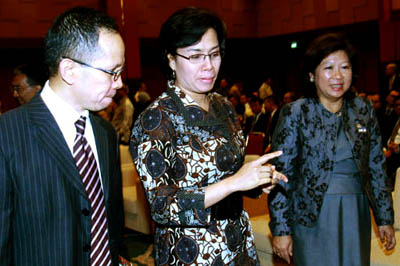Unlike the previous Vice President, Jusuf Kalla, the new Vice President, Boediono, was expected to provide coherence in economic policy. Working with him were three highly accomplished women, all with doctorates in economics. At the sharp end was Sri Mulyani Indrawati, an able, tough and outspoken finance minister, retaining that position, and committed to continue her wide-ranging reform agenda. Mari Pangestu, like Boediono an Australian graduate, and the most knowledgeable trade minister in the region, retained her post. They were joined by a newcomer, Armida Alisjahbana, as planning minister, who was expected to give that agency a much-needed boost in its main task of coordinating development policies.
This week’s essay by Don Emmerson on the politics of Mulyani’s departure makes that all seem a very long time ago. Mulyani and her technocratic colleagues have been subject to relentless attack by Aburizal Bakrie, wealthy businessman and coordinating minister for the economy in SBY’s ‘rainbow coalition’, over the Bank Century bail-out affair, in retaliation for the exposure of him and others to charges of tax fraud and corruption.
Mulyani goes with a stellar record and credentials. She leaves behind the deep worry: that SBY has failed to stand behind her, succumbed to the powerful interests lined up against reform and mortally compromised the promise of his pro-reformist party and commitments. The omens do not look good. Maybe the President can re-position after Mulyani’s departure and restore the momentum. But he will have to act quickly and decisively to do that, not only by his choice of Mulyani’s replacement but also by throwing his own weight unequivocally behind the reform effort.
Last Tuesday we reported the sad news of Hadi Soesatro’s death in Jakarta. Hadi was a towering figure in ASEAN, East Asian and Pacific public affairs. His nobility always shone through. We shall miss him terribly.


There is some interesting analysis on the Mulyani departure and the commentary surrounding it here at the Ravespot blog: http://ravespot.wordpress.com/2010/05/11/ambassador-says-mulyanis-exit-a-blow-to-reform-in-indonesia/